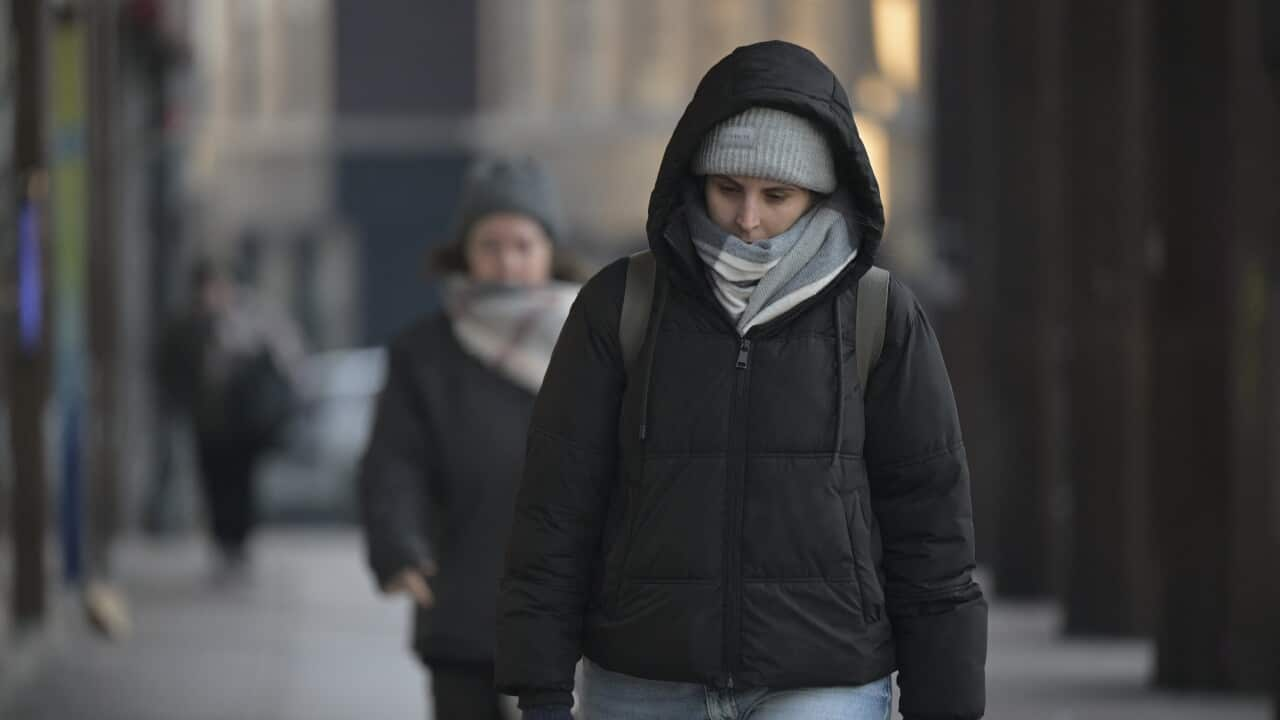Much of Australia has been shivering through a cold snap for the past few days and there is more to come.
Senior meteorologist at the Bureau of Meteorology Miriam Bradbury said it had been colder than usual through central and eastern parts of Australia.
She said temperatures in the Northern Territory, South Australia, Queensland, NSW, the ACT and Victoria were all about two to six degrees below average on Tuesday.
“It is colder than usual, but mostly through central and eastern parts of the country,” Bradbury said.
A number of warnings are in place for the southeast, with strong winds having been recorded in Tasmania continuing to move north over the next couple of days and the potential for rainfall to cause flooding.
In contrast, Bradbury said much of Western Australia was experiencing slightly warmer temperatures than usual.
“The west is actually sitting a little bit above average, generally two to four degrees above average, and that’s going to continue for the next couple of days,” she said.
The rest of the week
Bradbury said the areas experiencing lower-than-usual temperatures would remain that way for a little longer.
“We’re going to see that cold persisting through much of the week, particularly through northern NSW, Queensland and parts of the Northern Territory.
“In those areas, we could see the temperatures dropping up to eight degrees below the average, particularly Wednesday and Thursday, which are looking like pretty cool days for those areas,” she said.
“That means temperatures across southern Queensland dropping down to 13 or 14 degrees, and through Central Australia, that means minimum temperatures sitting at 15 or 16 degrees, so very cool for those parts for this time of year.”
She said by Wednesday the cold front could bring maximum temperatures in Darwin about four or five degrees below what is usual for this time of year.
“Just to put that into perspective, the forecast for Darwin does drop from around 31-32C today back to around 28C by the end of the week.”
There is even a chance that there could be some snow in parts of Queensland. Source: Getty / Christine Rose Photography
The Bureau of Meteorology has even suggested there could be snow in some areas, including Queensland.
Possible snow flurries have been forecast in the Northern Tablelands in NSW and even Queensland’s Granite Belt if the weather becomes cold enough.
However, the snow in Queensland is unlikely to bring any snow-covered scenes as the snow flurries will be less likely to settle to the ground.
Bradbury said the cold weather in eastern and central states would likely “linger right through to the end of the week and into next weekend”.
Relief from the cold
Bradbury said that still being more than a month away from the end of winter there was always the chance of “further weather systems moving across southern parts of the country that are going to bring fresh bursts of cold air”.
However, there could be somewhat of a reprieve from the coldest temperatures into the weekend.
“Into the later part of Saturday and into Sunday there may be some patches of average to just slightly above average temperatures coming back into our forecast,’ Bradbury said.
What’s causing the cold?
Bradbury said the pressure systems at play at the moment, consisting of a low to the southeast and a high over the Great Australian Bight, were pulling cold air up from the south.
“The main driver of this cold snap across the east and central parts at the moment is a pretty powerful low-pressure system sitting just east of Tasmania at the moment,” she said.
“It is causing quite a bit of severe weather in the southeast in terms of winds, rain, snow, that kind of thing.
“But the other thing that it’s serving to do is pull up air from across the Southern Ocean from those areas much further south towards Antarctica.
“It’s pulling that really cold air up and it’s extending it north, across the mainland and that’s already moved in ahead of those winds and rain impacts.
“That’s why we’re really seeing it across those parts of NSW and Queensland already.
“We had some very, very cool mornings for those areas today, I think Gold Coast saw their coldest morning in two years, so very chilly there.”
The Gold Coast recorded its coldest morning in two years on Tuesday. Source: Getty / oxime
A cold snap in a warming climate
Despite the cold snap, the long range forecast for across Australia this Winter are for .
“That doesn’t mean we won’t have these colder breaks in between,” Bradbury said.
“The thing with climate is that it happens over much longer time periods, so not just, hours and days, which is what we usually use when we talk about weather, where a system moves through bringing some showers this morning, but it’s gone by the afternoon.
“But climate is in the order of weeks to months to even years, and the trends that we see over those longer timescales are for warming conditions.
“If you average out all the temperatures across that whole three month period, they’re going to be above average.”


